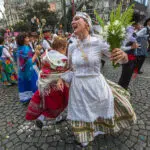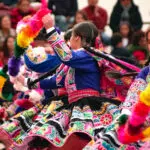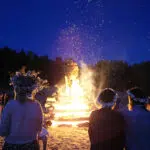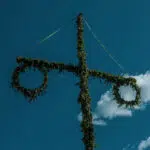Midsummer is celebrated on June 24 and it’s a day that’s meant for us to appreciate all the gifts that nature gives us. The summer solstice marks the longest day of the year and that lands on June 20, but because the old Julian calendar marked it differently, the date for Midsummer Day remains June 24. The holiday originates from Sweden, but it’s celebrated all over the world and many use the weekend closest to the date for traditional festivities.
History of Midsummer
Midsummer started as a pagan ritual for fertility and a successful harvest during the Stone Age. The pagans believed that plants had healing properties during the summer solstice and they honored the day showing reverence to nature with rituals. They danced around maypoles, fashioned garnets, and herbs were picked on Midsummer’s Eve and bonfires were used to keep away any evil spirits. It was said that spirits were free to roam the earth when the sun was turning towards the southern hemisphere.
In the fourth century, the holiday was changed to fit into Christian beliefs that honored St. John the Baptist called St. John’s Day. In the Gospel of Luke, Saint John’s birthday is said to be six months before the birth of Jesus, which would put his birthday in June. It was celebrated by bathing in water the night before for purification, a feast, and prayer on the holiday, but despite the name change, some of the customs from Midsummer remained.
In the Middle Ages, Germany had its own Midsummer rituals which would eventually be adopted by Sweden and others. Germanic neopagans called their summer solstice festival Litha. In their rituals, the Maypole was decorated with leaves and raised on May 1, which is where the name comes from. It was hard to find green leaves during that time, and the holiday was moved to Midsummer.
Today, it’s still a celebrated holiday and it’s incredibly popular. In Sweden, it comes only second to Christmas and people travel from all over the world to experience it themselves. During the time of the Summer Solstice, inhabitants of the British Isles and Scandinavia have nearly a full day of sunlight, making it easy for them to imagine how the Pagans once lived and they reenact the traditions of old.
Midsummer timeline
Pagans hold festivities and rituals honoring nature, fertility, and a successful harvest.
Midsummer is co-opted by Christianity and called St. John’s Day.
Germany celebrates with customized rituals like maypoles decorated with leaves.
People celebrate the ancient day by dancing, eating, bonfires, and festivals.
Midsummer FAQs
Why is Midsummer called Midsummer?
The summer-solstice is considered to be “mid-summer” because it’s believed to be the longest day of the year.
What is Swedish midsummer?
Sweden’s “Midsommar” is a summer celebration many Scandinavian countries look forward to after their long and dark winters.
How do you celebrate Midsummer?
Midsummer is usually celebrated with a traditional feast, incense, a bonfire, maypoles, and connecting with nature.
Midsummer Activities
Midsommar
Visit Sweden and experience Midsommar where the pagans once did. Travel to the countryside where you can attend festivities, make flower garlands, drink traditional drinks like nubbe, and dance around maypoles. You can also learn ancient history firsthand from Swedes who know what they're talking about.
Eat like the pagans
Celebrate the day by preparing traditional foods. Pagans would eat foods that consisted of fresh garden fruits and vegetables in a variety of dishes in honor of their deities. Use recipes for pickled herring to make sill, potatoes for potatis, cured salmon for gravlax, crispy bread for Knäckebröd, and more. If they’re too complicated, simple salads and vegetables will do just fine.
Nature hike
Experience nature in a new way by going on a hike by yourself or with friends. Midsummer is about connecting with nature, so explore a new trail that you've never taken before and really notice your surroundings. Pay attention to all the different trees and flowers and give appreciation for the wonder that is nature.
Five Facts About Midsummer
Empty cities
During Midsummer, cities are left practically vacant as residents leave for the countryside.
Sweet dreams
There's a tradition where people pick seven different species of flowers and place them under their pillows to dream of their future spouse.
Folklore
Many people wear a traditional folk dress called folkdrekten and make their own flower crowns called krans.
Feel the spirit
People drink a spirit called aquavit that's distilled from potatoes or grains and flavored with either caraway or dill seed.
Hopping mad
There are songs sung about frogs and people hop around the maypole like they're frogs themselves.
Why We Love Midsummer
Respecting tradition
It’s impressive that the spirit of Midsummer is still celebrated today when it could have easily been forgotten. The passage of time and the attempts to change the holiday weren’t enough to get rid of it, and its perseverance deserves respect simply for withstanding the obstacles in its way. Its longevity and the love that people have for it is proof enough that the holiday is here to stay.
Loving nature
Midsummer reminds us that we should be appreciative of nature. Without it, we wouldn’t be able to survive. There’s a direct correlation between people and plants with every breath we take. Stopping to smell the flowers and being one with nature is something that we should all do more often.
Thinking of others
It helps us think of our fellow humans. It's always good to be kind to our family and friends, but we should extend ourselves to everyone. Midsummer is about being appreciative of the day itself and offering selfless gifts with the hopes of bettering others. There can never be too many reminders to be charitable.
Midsummer dates
| Year | Date | Day |
|---|---|---|
| 2026 | June 24 | Wednesday |
| 2027 | June 24 | Thursday |
| 2028 | June 24 | Saturday |
| 2029 | June 24 | Sunday |
| 2030 | June 24 | Monday |





















